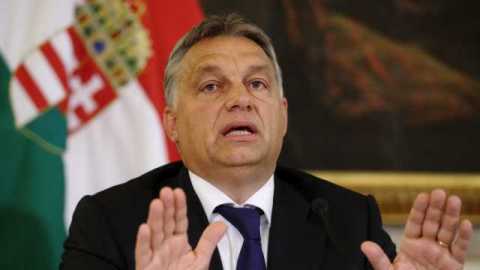
BUDAPEST, Feb 12 (Reuters) - Hungary's Prime Minister Viktor Orban on Saturday extended a fuel price cap and flagged more generous family support measures if he is re-elected at an April 3 election where he faces the biggest challenge so far to his 12-year-long rule.
Orban, in his annual state of the nation speech, accused his opponents of planning a return to economic mismanagement that pushed the country to the brink of financial collapse in 2008.
For the first time since 2010, Orban and his ruling nationalist Fidesz party will face a united front of opposition parties at the polls, which is likely to be the tightest election since his 2010 landslide.
Minutes before Orban started his speech, opposition leader Peter Marki-Zay said on Facebook that the six-party alliance had gathered enough signatures to field candidates in all 106 constituencies.
"The only saving grace of Viktor Orban's state of the nation speech is that it was his last as prime minister," opposition leader Marki-Zay said on Facebook after Orban's speech ended.
Orban's path to re-election is also complicated by surging inflation, on track to reach its highest since 2008, and a row with the European Union over democratic standards, which has triggered a freeze in pandemic recovery funding.
On Saturday, Orban accused the EU of waging what he called a rule-of-law campaign against Hungary ahead of a European Court of Justice ruling next week on the legality of a new mechanism linking payments for member states to democratic standards.
PRICE CAP
To soften the impact of surging prices, Orban's government put curbs on the cost of basic foods in February, extending caps already in place on the price of energy, fuel and mortgage borrowing.
"The price cap (on fuel) has worked, therefore we are extending this for another three months," Orban said.
That means a rule capping retail fuel prices at 480 forints ($1.53) per litre, which had been due to expire next week, will remain in place until May 15.
Despite the price controls, Hungarian consumer prices rose at their fastest pace in almost 15 years in January and core inflation surged, leading analysts to raise inflation forecasts and signalling the need for more interest rate hikes.
Orban has also put a limit on retail mortgage interest rates until the end of June to shield borrowers from increasing repayment costs after surging inflation prompted the central bank to raise interest rates more than expected.
Orban's government, which is giving households tax rebates and other measures worth a combined 1.8 trillion forints ($5.83 billion) in the run-up to the vote, expects economic growth to slow to around 5% this year from nearly 7% in 2021.
Orban's Fidesz party pulled two percentage points ahead of the opposition alliance in a January survey by pollster Republikon Institute published last month.
UKRAINE TENSIONS
In the speech, Orban expressed hope that war in neighbouring Ukraine could still be avoided, while raising the prospect of hundreds of thousands of refugees seeking shelter in Hungary.
"Hungary's interests are clear: first of all, war must be avoided," Orban said in his speech.
"If there is a war, hundreds of thousands, or millions of refugees could come from Ukraine, which would completely redraw Hungary's political and economic landscape."
($1 = 313.99 forints)




